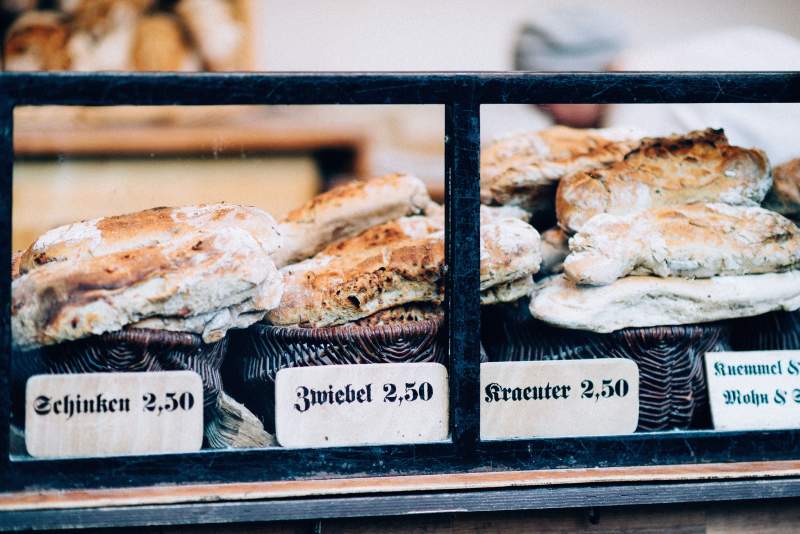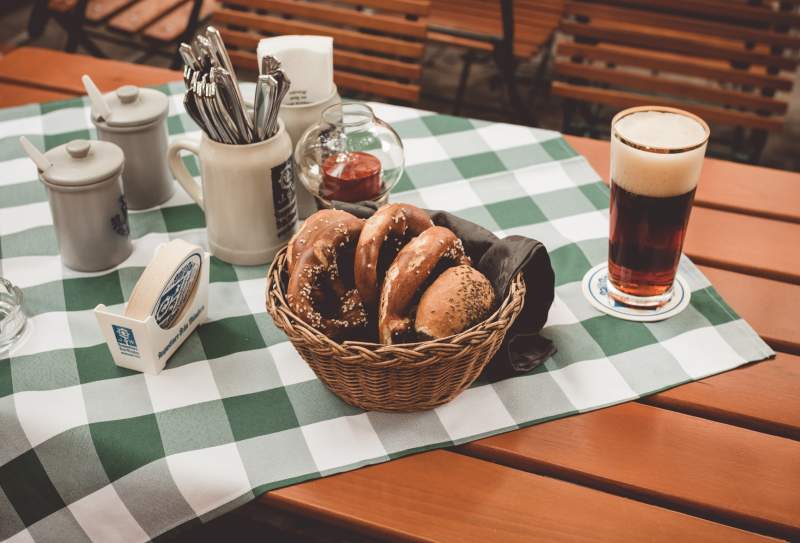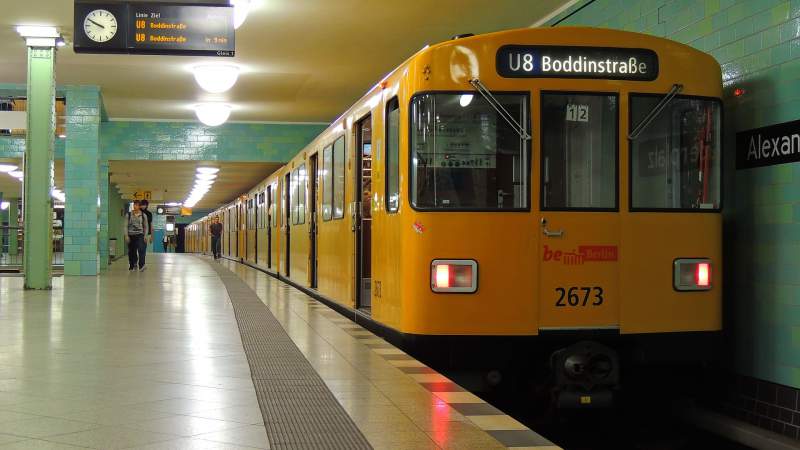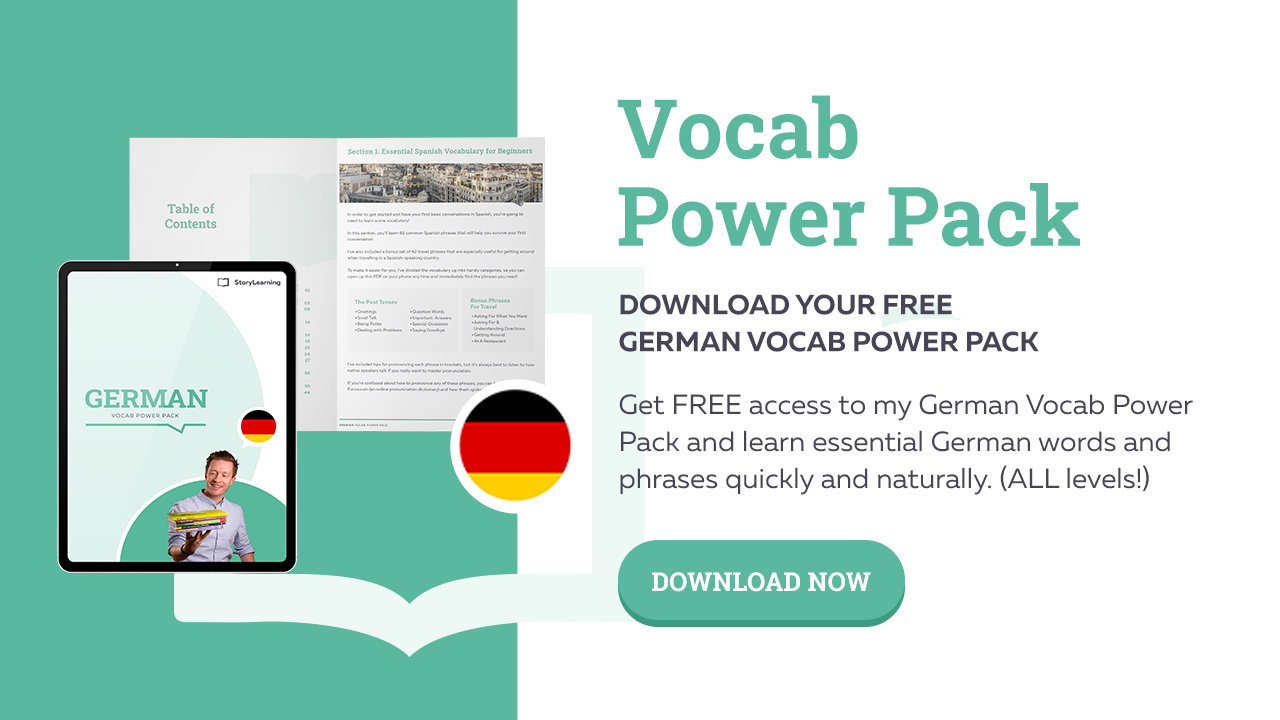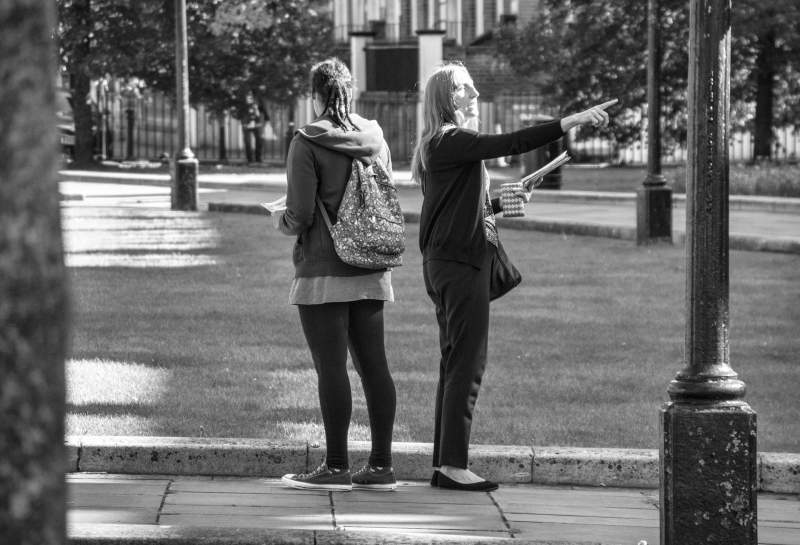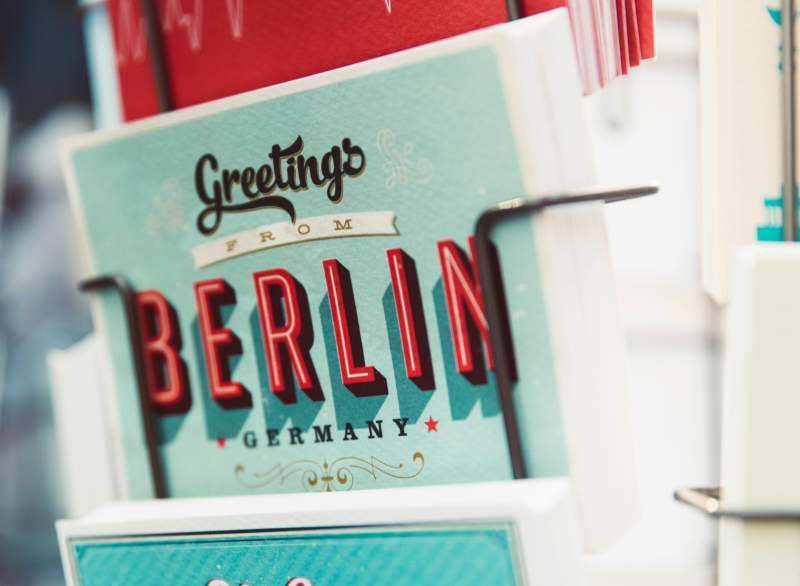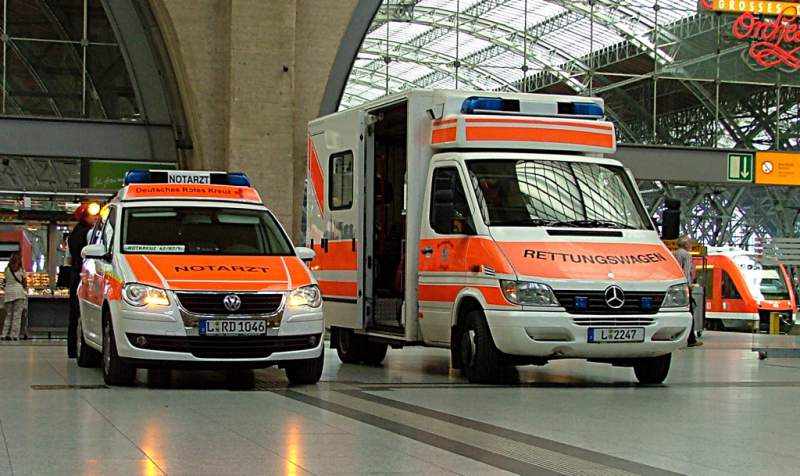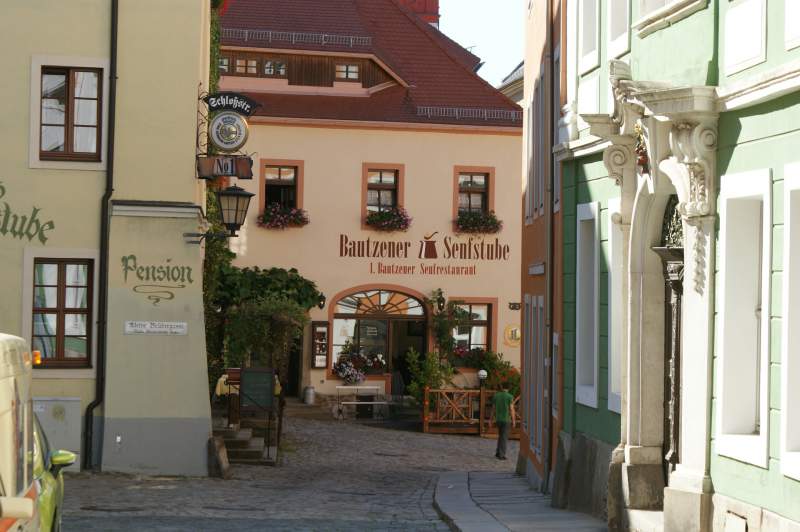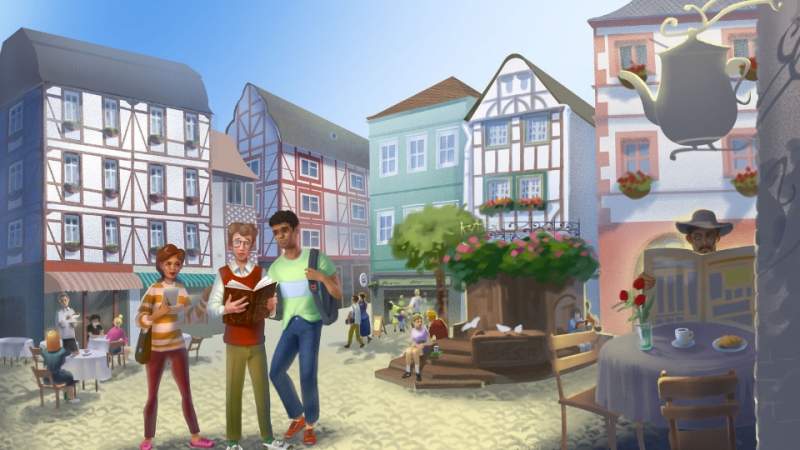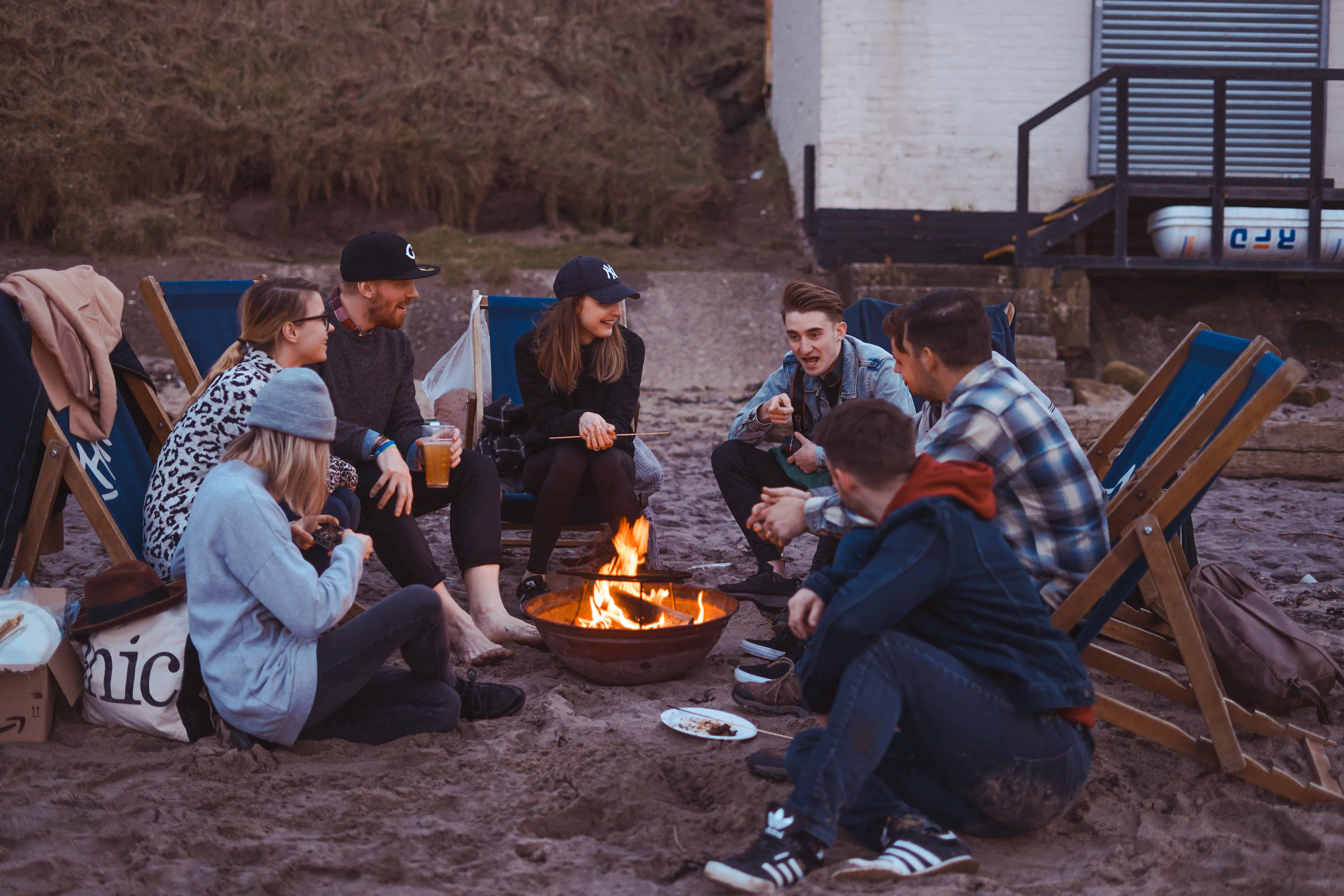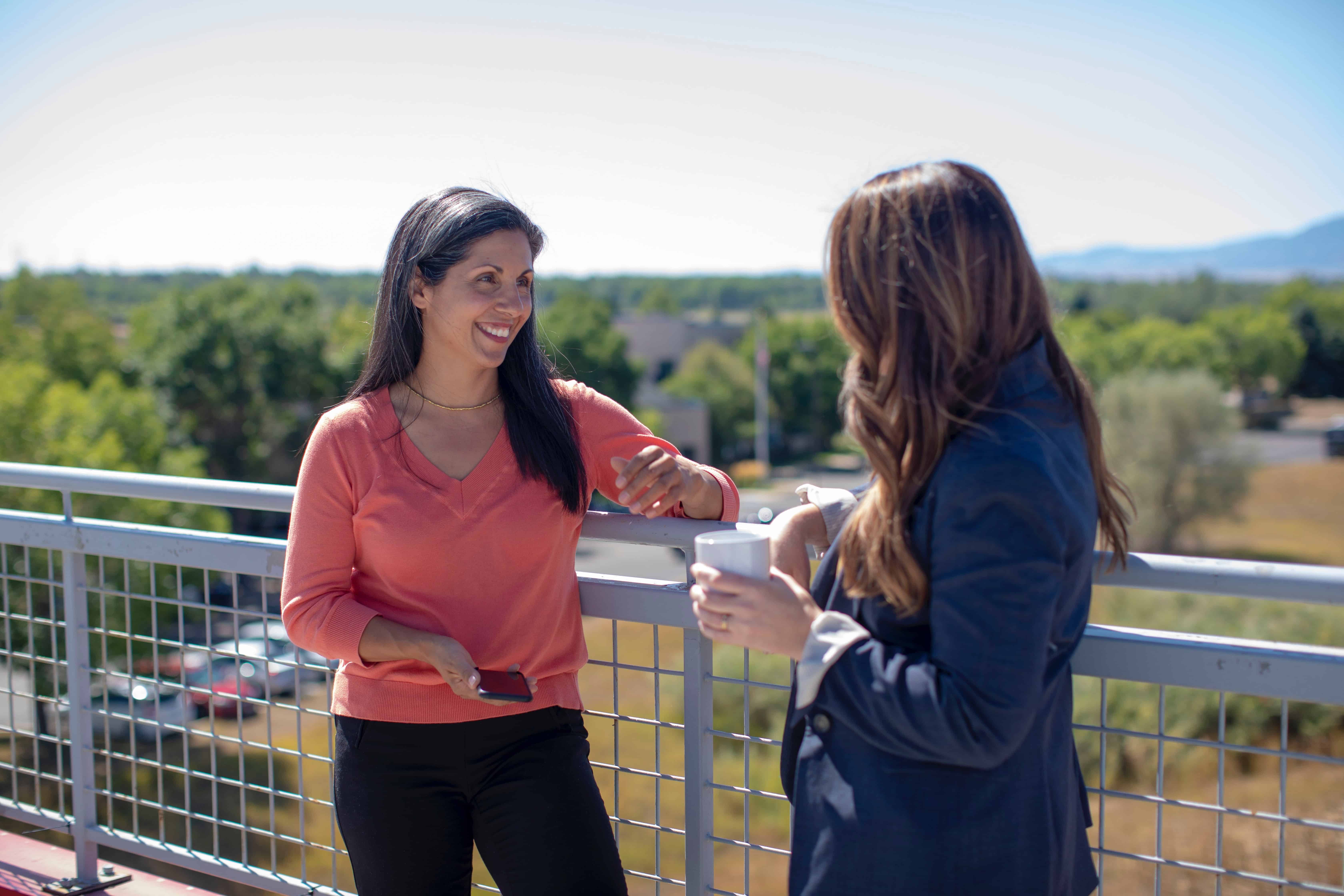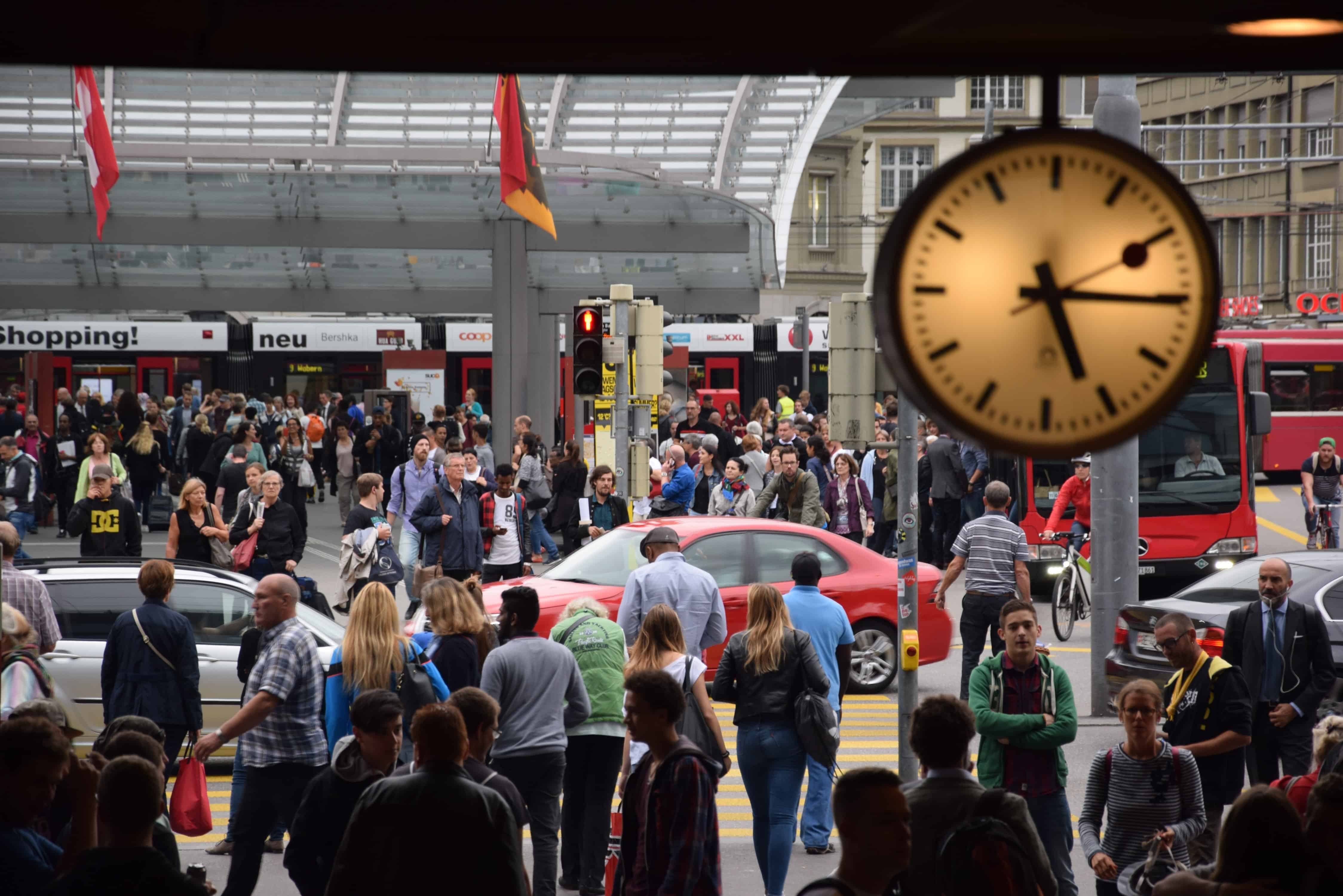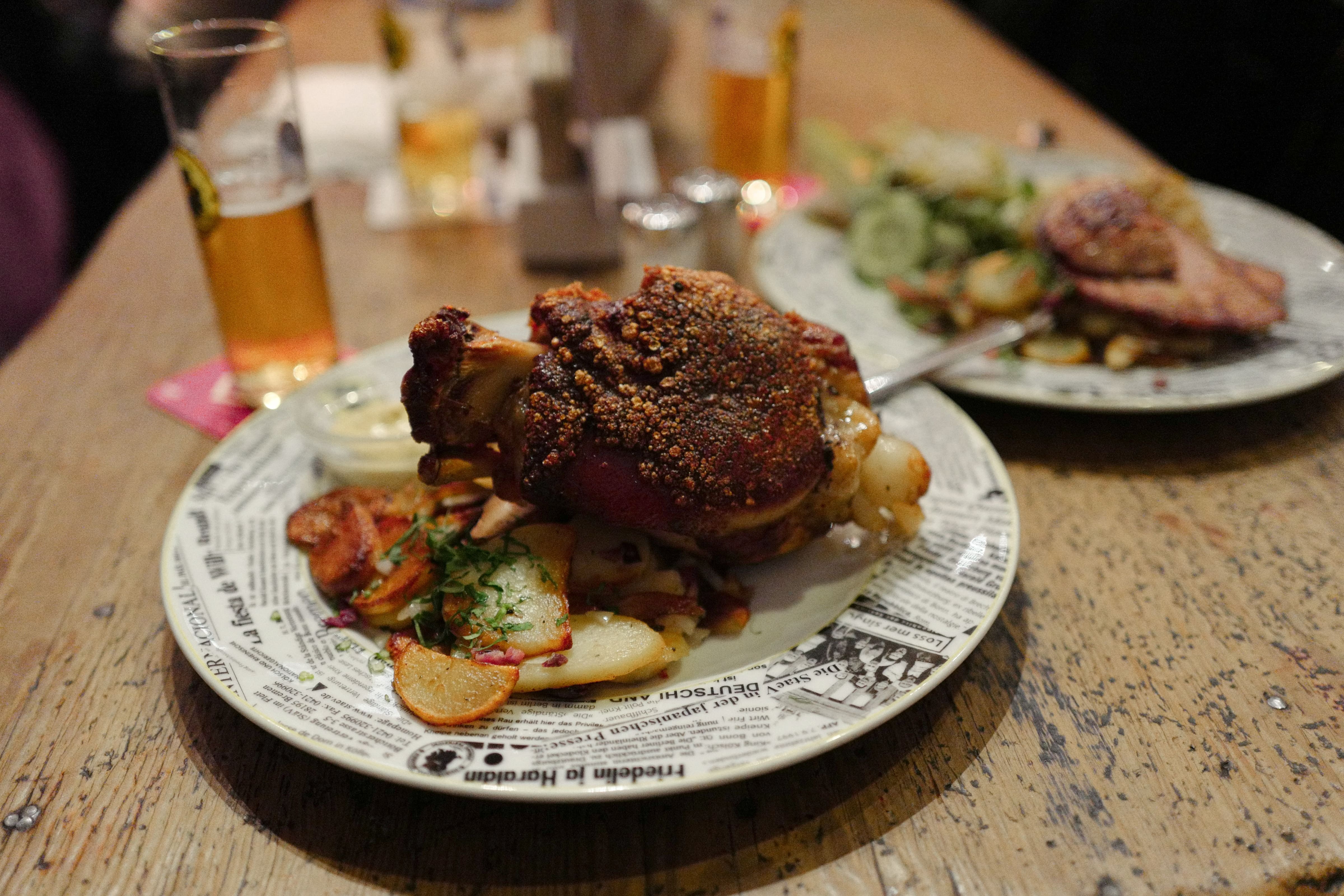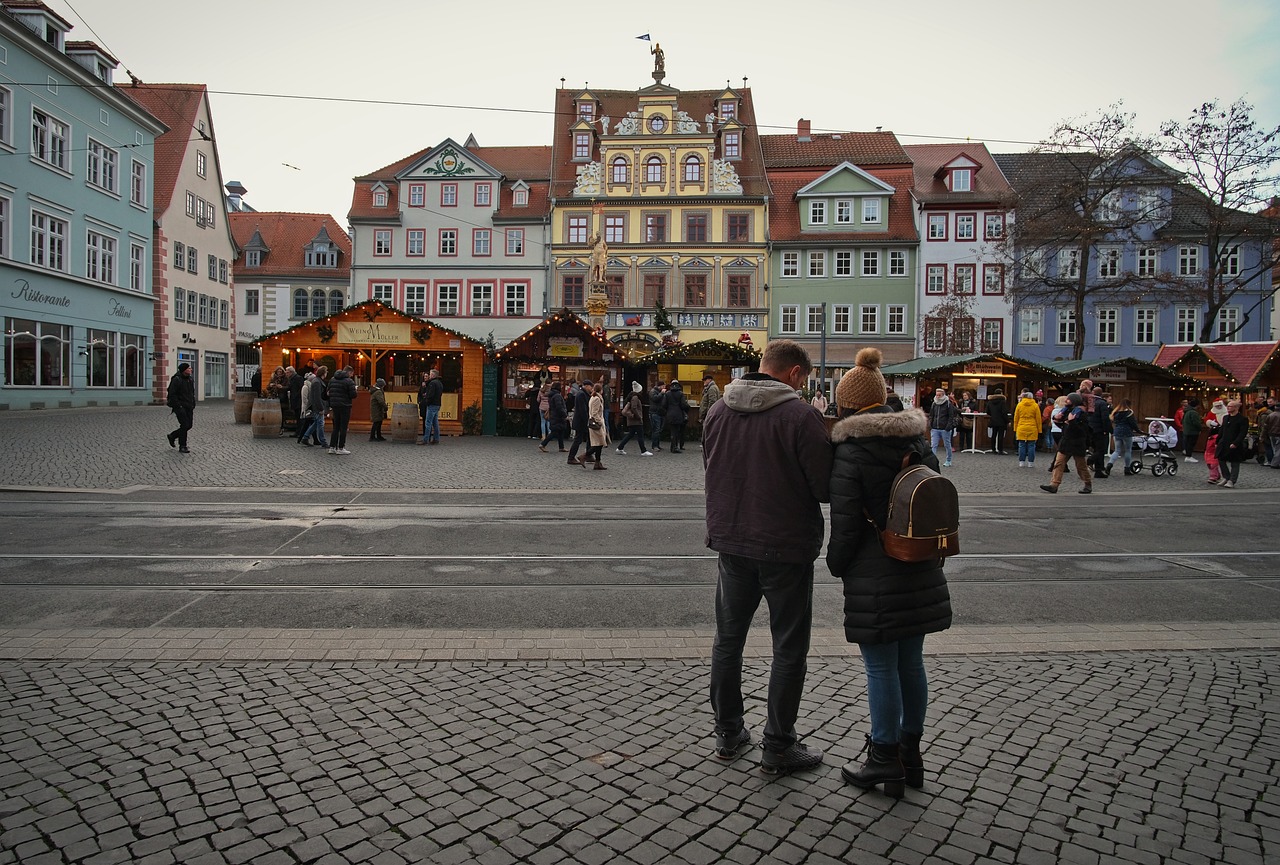
Have you ever wanted to learn German?
Or are you planning a trip to a German-speaking country?
To get started and have your first basic conversations in German, you’re going to need to learn some words!
In this post, you’ll learn 92 basic German phrases and words that will help you on your travels or just at home.
To make it easier for you, I’ve divided the phrases into different categories.
- German Greetings & Introductions
- “I do not understand!” – Getting Out Of Sticky Situations
- Numbers In German
- Visiting A German Restaurant
- Transport – Getting Around In Germany
- Asking For Directions
- Shopping In German
- Dealing with Medical Emergencies
- Finding Hidden Gems
Whether you’re going to Germany or Austria or Switzerland, chances are you can get by in English. But if you learn basic German too, you’ll be able to connect more with German speakers.
Having a few common German phrases will make you experience these countries in a completely different way.
And even at home, learning German will allow you to learn more about German culture and connect with native German speakers in your local community.
You don’t need to have a natural flair for language learning. Learning a few key phrases and being able to use them is a great start. And German isn’t as hard as its reputation suggests, especially for native English speakers.
You never know, maybe learning these phrases will motivate you to go on and learn to speak German fluently.
Note: Want to go beyond basic German phrases and learn German with confidence and fluency? The best way to do so is by working through a comprehensive and well designed course.
My top recommendation is German Uncovered, my in-depth online German course for beginners that teaches you through the power of story. If you’re ready to get started, click here for a 7-day FREE trial.
German Greetings & Introductions
If you want to make a good impression with German speakers, you’ll need a few basic phrases to meet and greet people.
After all, you’re going to use greetings every time you have a conversation in German!
These phrases are simple, easy to remember and will help you make new German friends.
#1 Hallo – Hello [any time of day]
#2 Hallo, wie geht’s? – Hello, how are you?
#3 Guten Morgen – Good morning
#4 Guten Tag [lit. good day] – Good afternoon
#5 Guten Abend – Good evening
#6 Gute Nacht – Good night
#7 Vielen Dank – Thank you very much
#8 Ich danke Ihnen auch – Thank you, too [in reply to “thank you” from someone else else]
#9 Tschüss, bis zum nächsten Mal – Goodbye, see you next time
#10 Schönes Wetter heute, nicht wahr? – It’s lovely weather today, is not it?
#11 Mein Name ist _ – My name is _____
#12 Ich bin Amerikaner, Kanadier, Engländer (male) – I’m American / Canadian / English
#13 Ich bin Amerikanerin, Kanadierin, Engländerin (female) – I’m American / Canadian / English
#14 Woher kommen Sie? – Where are you from?
#15 Freut mich – Nice to meet you!
⬑ Jump back to the contents
“I Do Not Understand!” – Getting Out Of Sticky Situations
It might seem a little intimidating to speak German, especially if you’re new to the language. German people will be understanding if you’re struggling to get your message across or catch what they say.
At the same time, don’t hesitate to use these expressions to help the conversation run smoothly if you don’t understand something or need a little help.
#16 Es tut mir leid, aber ich verstehe nicht – I’m sorry, but I do not understand
#17 Ich spreche nicht gut Deutsch – I do not speak German very well
#18 Können Sie das bitte wiederholen? – Could you say that again please?
#19 Können Sie bitte langsamer sprechen? – Could you say that more slowly please?
#20 Schreiben Sie das bitte für mich auf – Please write that down for me
#21 Was bedeutet das? – What does that mean?
#22 Sprechen Sie Englisch? – Do you speak English?
#23 Es tut mir leid – I’m sorry
#24 Ich weiß nicht – I do not know
#25 In Ordnung – All right
#26 Macht nichts – never mind
⬑ Jump back to the contents
Numbers In German
Whether you’re at the supermarket, ordering in a restaurant, or just having a normal conversation, it’s essential to know how to use numbers in German. Eins, zwei, drei….let’s get to it!
- null – zero
- eins – one
- zwei – two
- drei – three
- vier – four
- fünf – five
- sechs – six
- sieben – seven
- acht – eight
- neun – nine
- zehn – ten
- elf – eleven
- zwölf – twelve
- dreizehn – thirteen
- vierzehn – fourteen
- fünfzehn – fifteen
- sechzehn – sixteen
- siebzehn – seventeen
- achtzehn – eighteen
- neunzehn – nineteen
- zwanzig – twenty
- einundzwanzig – twenty-one
- zweiundzwanzig – twenty-two
- dreiundzwanzig – twenty-three
- vierundzwanzig – twenty-four
- fünfundzwanzig – twenty-five
- sechsundzwanzig – twenty-six
- siebenundzwanzig – twenty-seven
- achtundzwanzig – twenty-eight
- neunundzwanzig – twenty-nine
- dreißig – thirty
- einunddreißig – thirty-one
- zweiunddreißig – thirty-two
- vierzig – forty
- fünfzig – fifty
- sechzig – sixty
- siebzig – seventy
- achtzig – eighty
- neunzig – ninety
- hundert – one hundred
- zweihundertfünfzig – two hundred and fifty
- fünfhundert – five hundred
- siebenhundertdreiundachtzig – seven hundred and eighty three
- tausend – one thousand
⬑ Jump back to the contents
Visiting A German Restaurant
One of the most enjoyable cultural experiences you can have in a German-speaking country is visiting a restaurant and trying out some of the delicious local dishes.
The following phrases cover all the questions and statements you need to make when eating out, from asking for a table to paying the bill!
#27 Ein Tisch für eine Person bitte – A table for one, please
#28 Ein Tisch für zwei Personen, bitte – A table for two, please
#29 Haben Sie schon auf? – Are you open yet?
#30 Können wir (auf einen Tisch) warten? – Can we wait (for a table)?
#31 Können wir dort sitzen? – Can we sit over there?
#32 Entschuldigung! – Excuse me! [Calling a waiter]
#33 Was empfehlen Sie? – What do you recommend?
#34 Was ist das beliebteste Gericht? – What’s your most popular dish?
#35 Was ist das? – What is this?
#36 Was für Bier haben Sie? – What type of beer do you have?
#37 Ein kleines Bier bitte – A small beer, please
#38 Ein großes Bier bitte – A large beer, please
#39 Bringen Sie mir bitte eine Auswahl von leckeren Sachen – Please bring me a selection of nice things
#40 Bitte wählen Sie etwas – It’s up to you / You can decide
#41 Die Rechnung, bitte – The bill, please
#42 Kann ich bitte die Speisekarte haben? – Can I have the menu, please?
By the way, if you’re interested in food and drink as it relates to German culture, take a look at this post about Oktoberfest, the world-famous Bavarian beer festival.
⬑ Jump back to the contents
Transport – Getting Around In Germany
There are lots of practicalities to consider when taking a trip to Germany, including finding your way around. Finding the right train or bus on time isn’t always easy and you don’t want to end up being the ‘foreigner’ who is holding up the ticket queue!
In this section, you’ll learn some key transport phrases that will help you quickly and easily navigate your way around any German-speaking city or country.
#43 Ich möchte nach _____ – I want to go to
#44 Wann fährt der nächste Zug / Bus nach _____? – What time is the next train/bus to __?
#45 Was kostet das? – How much is it?
#46 Einmal/ zweimal (nach _____), bitte – 1 ticket / 2 tickets (to _____), please
#47 Wie lange dauert das? – How long does it take?
#48 Wohin muss ich jetzt gehen? – Where should I go now?
#49 Wann fährt er ab? – When does it leave?
#50 Wie spät ist es (jetzt)? – What time is it (now)?
#51 Hält der Zug/ Bus in _? – Does this train/bus stop in _____?
#52 Entschuldigen Sie, ist dies _____?– Excuse me, is this _____ ? [Useful when you’re on the bus / train and are not sure when to get off]
#53 Können Sie das bitte für mich aufschreiben? – Can you write that down for me?
#54 Zeigen Sie mir das bitte auf der Karte? – Can you show me on the map?
#55 Wo ist _____ auf der Karte? – Where is _____ on the map?
⬑ Jump back to the contents
Asking For Directions In German
Public transport in Germany is notoriously excellent, but there are some places you’ll need to walk or drive to yourself. And for most of us, that means occasionally getting lost and asking for directions!
Here are the phrases you need to ask and receive directions in German:
#56 Entschuldigung, darf ich Sie etwas fragen? – Excuse me, could I ask you something?
#57 Ich möchte nach _____ – I want to go to _ [If you know the name of your destination]
#58 Ich möchte dahin – I want to go here [Pointing to your destination on the map]
#59 Ich habe mich verlaufen – I’m lost (on foot)
#60 Ich habe mich verfahren – I’m lost (by car)
#61 Wie komme ich dahin? – How can I get there?
#62 Geht es hier lang? – Is it this way? [Useful for checking if you’re walking in the right direction]
#63 Zeigen Sie mir das bitte auf der Karte? – Can you show me on the map?
#64 Wo ist __?– Where is _ ?
⬑ Jump back to the contents
Whether you’re at the supermarket, the shopping centre or the local farmer’s market you’re going to buy things at some point or another!
And even haggle a bit – just like you would in English. Grab a bargain in German with these sentences.
#65 Das gefällt mir – I like this
#66 Was kostet das? – How much is this?
#67 Bitte wiederholen Sie das – Can you say that again please?
#68 Schreiben Sie das bitte für mich auf? – Can you write that down for me?
#69 Und wenn ich das alles kaufe? – If I buy these together? [A useful way to knock the price down]
#70 Das ist mir zu teuer – it’s too expensive for me
#71 Geben Sie mir einen Rabatt? – Can you give me a discount?
#72 Ich suche nach _____ – I’m looking for a _____
#73 Ich schaue mich nur um – I’m just looking around
#74 Danke, ich suche noch weiter – Thank you, I’ll keep looking [if you’re getting hassled to buy something]
#75 Moment, bitte – Just a moment
#76 Ja, bitte – Yes, please
#77 Nein, danke – No, thanks
⬑ Jump back to the contents
Dealing With Medical Emergencies In German
Hopefully, you’ll never need the phrases in this section! Nonetheless, it’s always good to know some basic medical vocabulary so that you can handle an emergency if you’re unwell or have an accident.
#78 Können Sie mir bitte helfen? – Can you help me, please?
#79 Ich brauche einen Arzt – I need to see a doctor
#80 Es geht mir nicht gut – I do not feel well
#81 Es geht ihm/ihr nicht gut – he / she does not feel well
#82 Gibt es ein Krankenhaus in der Nähe? – Is there a hospital near here?
#83 Fahren Sie mich bitte zum Krankenhaus – Take me to the hospital [To a taxi driver]
#84 Es tut hier weh – It hurts here [pointing to body part]
#85 Ich brauche Medizin – I need some medicine
⬑ Jump back to the contents
Finally, let’s learn a few more phrases that don’t fall into any particular category. These final examples of basic vocabulary will allow you to sound more polite and natural.
I’ve included a couple of questions you can ask the locals, so you can find the hidden gems in their cities and have a more authentic German experience!
#86 Es tut mir leid, Sie zu stören, aber… – I’m sorry to bother you, but …
#87 Kann ich Sie schnell etwas fragen? – Could I ask you something quickly?
#88 Ich suche ein Restaurant mit gutem Essen hier in der Nähe – I’m looking for a place with good food around here
#89 Ich suche ein nettes Café in der Nähe – I’m looking for a nice cafe in the area
#90 Wissen Sie etwas über _____? – Do you know anything about _____ ?
#91 Gibt es hier in der Nähe etwas Interessantes zu sehen? – Is there anything interesting to see in this area?
#92 Trotzdem danke – Thank you anyway [if the person can not help you]
⬑ Jump back to the contents
Your Next Steps In German
So there you have it: a collection of German expressions to help you get started on your new adventure!
With these phrases in your back pocket, you’ll soon find yourself having your first basic conversations and getting excited about continuing to improve your German.
So now that you’ve learned the basics, are you ready to take the next step in your German adventure?
I’m a big believer in the power of story to enable you to learn a language. That’s why I’ve created an entire beginner course to help you learn German online by immersing yourself in a compelling story.
It’s my German Uncovered course, and it’s designed to take you from beginner to B1 Intermediate level.
Click here for more information on the course and how it’ll help you.
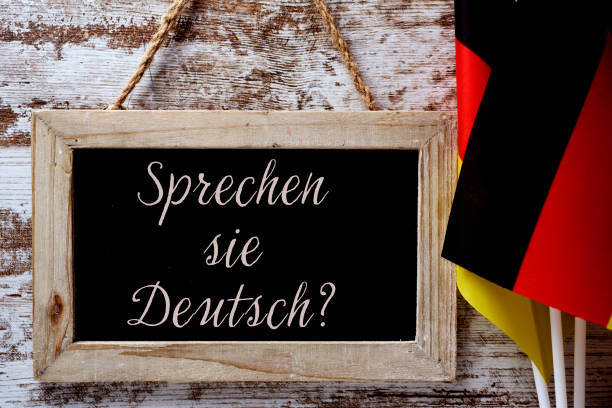
There are certain words and phrases that every language uses on the daily.
If you can learn these German phrases, you’ll find everyday conversation much easier to navigate!
This post contains 140 useful German phrases sure to boost your conversational skills and help you out in any situation.
Contents
- Common German Slang
- Basic Greetings in German
- Asking for Help in German
- German Conversational Phrases
- Food and Drink in German
- German Travel Phrases
- German Shopping Phrases
- German Expressions in Cases of Emergency
- Why You Should Learn German Phrases
- How to Learn Common German Phrases
Download:
This blog post is available as a convenient and portable PDF that you
can take anywhere.
Click here to get a copy. (Download)
Common German Slang
These German slang phrases are fun and will definitely give you extra street cred and impress your German friends.
1. Moin, moin
Meaning: Morning/Hi/Hello/Good day/How are you?
This multi-purpose phrase is mostly used in Northern Germany.
2. Geil
Meaning: Awesome/Cool/Sexy
This slangy term can be used for all things good, just tread carefully—it can refer to sexual arousal, too.
3. Dit jefällt ma
Meaning: I like it
This is Berlinian dialect for Das gefällt mir (I like it).
4. Na?
Meaning: Hey, what’s up?/How are you?
You can even answer this with Naaa? to say “I’m good, how about you?”
5. Basta
Meaning: Period
As in, “end of discussion.” This is useful when you’re not interested in hearing any backchat or excuses.
6. Quatsch
Meaning: Nonsense/That’s ridiculous
7. Ich habe die Nase voll
Meaning: I’m fed up/I’m sick of it
Literal: I have a full nose
8. Das ist nicht mein Bier
Meaning: Not my problem
Literal: That’s not my beer
You can also say das ist dein Bier (this is your beer) to point out that the thing in question is someone else’s burden to bear.
9. Abwarten und Tee trinken
Meaning: Just wait and see
Literal: Wait and drink tea
10. Ich verstehe nur Bahnhof
Meaning: I don’t understand any of that/It’s all Greek to me
Literal: I only understand train station
11. Es ist mir Wurst
Meaning: I don’t care
Literal: It’s sausage to me
12. Das Leben ist kein Ponyhof
Meaning: Life is no picnic
Literal: Life is not a pony farm
13. Da haben wir den Salat
Meaning: Everything is a mess/Now we’re in a pickle
Literal: Here we’ve got the salad
14. Leben wie Gott in Frankreich
Meaning: Live like a king
Literal: Live like God in France
This phrase is a reflection of the past. At a time in history, royalty lived fancy and rich in the kingdom of France while the German city-states lived in relative poverty, struggling to feed themselves.
15. Der Zug ist schon abgefahren
Meaning: That ship has sailed/The opportunity is gone
Literal: The train has already left
16. Innerer Schweinehund
Meaning: Devil on your shoulder
Literal: Inner pig-dog
The German people’s “inner pig-dog” is the voice in one’s head that steers you wrong.
17. Morgenstund hat Gold im Mund
Meaning: The early bird gets the worm
Literal: Morning hours have gold in the mouth
18. Hunde, die bellen, beißen nicht
Meaning: His bark is worse than his bite
Literal: Dogs that bark don’t bite
Basic Greetings in German
Now, let’s go over how to say hello to native German speakers and exchange some basic pleasantries.
19. Hallo
Meaning: Hello
20. Guten Morgen
Meaning: Good morning
This is a common greeting used until noon.
21. Guten Tag
Meaning: Good afternoon
Use this between noon and 6 pm.
22. Guten Abend
Meaning: Good evening
This greeting is used from 6 pm to bedtime.
23. Wie geht es Ihnen?
Meaning: How are you? (formal)
This form should be used with strangers and people who command respect, such as a boss, teacher or elder.
24. Wie geht’s dir?
Meaning: How are you? (informal)
You can use this version of the phrase in more casual interactions, like with friends and family.
25. Mir geht es gut, danke
Meaning: I am fine, thank you
26. Freut mich zu hören
Meaning: Glad to hear it
27. Mir geht es nicht so gut
Meaning: I’m not so good
28. Es tut mir leid
Meaning: I’m sorry
You might also hear the shortened version: tut mir leid.
29. Gesundheit
Meaning: Bless you (said after someone sneezes)
Literal: Health
30. Alles Gute zum Geburtstag!
Meaning: Happy birthday!
31. Machs gut
Meaning: Take care
32. Bis später
Meaning: See you later
If you know you’re seeing this person again within the next day, you can bid them farewell with this phrase.
33. Bis bald
Meaning: See you soon
If you think you’ll see this person again in the near future but you’re not exactly sure when, you can opt for this expression.
34. Auf Wiedersehen
Meaning: Goodbye
35. Tschüss
Meaning: Bye
36. Gute Nacht
Meaning: Good night
37. Einen schönen Tag noch
Meaning: Have a nice day
38. Schönes Wochenende
Meaning: Have a nice weekend
Asking for Help in German
As a stranger in a German-speaking country, you will likely need help from a local at some point or another; these phrases will make it a little easier.
39. Entschuldigung
Meaning: Excuse me/Sorry
You’ll also likely hear the contracted version when out and about: ‘Schuldigung.
40. Sprechen Sie Englisch?
Meaning: Do you speak English? (formal)
41. Ja
Meaning: Yes/Yeah
42. Nein
Meaning: No
43. Bitte
Meaning: Please
This word has several important functions in German.
44. Ich spreche nur ein bisschen Deutsch
Meaning: I only speak a little German
45. Ich brauche eine Auskunft
Meaning: I need some information
46. Ich brauche Hilfe
Meaning: I need help
47. Bin ich hier richtig?
Meaning: Am I in the right place?
48. Wie sagt man … auf Deutsch?
Meaning: How do you say … in German?
49. Danke schön
Meaning: Thank you
There are many ways to say thank you in German. Danke schön is like the English “thank you,” whereas danke on its own is like “thanks.”
50. Vielen Dank für Ihre Hilfe
Meaning: Thanks so much for your help (formal)
51. Gern geschehen
Meaning: You’re welcome
German has other ways to express “you’re welcome,” too.
German Conversational Phrases
These phrases will help you hold a conversation in German—you can even practice before you go! Note that some phrases differ in formality.
52. Wie ist Ihr Name?/Wie heißt du?
Meaning: What is your name? (formal/informal)
53. Ich heiße…/Mein Name ist…
Meaning: My name is…
54. Woher kommen Sie?/Woher kommst du?
Meaning: Where are you from? (formal/informal)
55. Ich komme aus…
Meaning: I’m from…
56. Wie lange bleiben Sie in Deutschland/Österreich/der Schweiz?
Meaning: How long are you staying in Germany/Austria/Switzerland?
57. Ich bleibe eine Woche hier
Meaning: I am staying here for one week
Of course, you can replace eine Woche with something like zwei Wochen (two weeks), sechs Tage (six days), etc.
58. Wie alt sind Sie?/Wie alt bist du?
Meaning: How old are you? (formal/informal)
59. Ich bin 20 Jahre alt
Meaning: I am 20 years old
Brush up on your German numbers so you can replace 20 with your own age.
60. Was machen Sie/Was machst du beruflich?
Meaning: What do you do for work? (formal/informal)
61. Ich bin…
Meaning: I’m a/an…
You don’t need an article in German (words like “a” or “the”) before the job title here, so you’re literally just saying “I am teacher” or whatever your job is.
62. Was machst du sonst so?
Meaning: What else do you do? (informal)
Learn some German words about hobbies so you can bust out this phrase and then understand the response.
63. Ich… gerne
Meaning: I like to…
64. Ich stimme dir zu
Meaning: I agree with you
65. Können Sie/Kannst du langsamer sprechen?
Meaning: Can you speak slower? (formal/informal)
66. Können Sie/Kannst du das bitte wiederholen?
Meaning: Can you repeat that please? (formal/informal)
67. Verstehen Sie?/Verstehst du?
Meaning: Do you understand? (formal/informal)
68. Ich verstehe nicht
Meaning: I don’t understand
69. Hat mich gefreut Sie/dich kennenzulernen
Meaning: It was nice meeting you (formal/informal)
Food and Drink in German
Now that you got a conversation going, you might end up with a meal invite! These German expressions will help you order food and drinks like a native.
70. Haben Sie/Hast du Hunger?
Meaning: Are you hungry? (formal/informal)
71. Haben Sie/Hast du Durst?
Meaning: Are you thirsty? (formal/informal)
72. Wollen wir zusammen was essen gehen?
Meaning: Shall we get something to eat together?
Or: Wollen wir zusammen was trinken gehen? (Shall we get something to drink together?)
73. Frühstück
Meaning: Breakfast
74. Mittagessen
Meaning: Lunch
75. Abendessen
Meaning: Dinner
76. Einen Tisch für vier bitte
Meaning: A table for four, please
At most German restaurants, you’ll just seat yourself at an open table, but if you’re greeted at the door, you can replace vier with the correct number of people in your party.
77. Ich möchte einen Tisch reservieren
Meaning: I’d like to reserve a table
When Germans eat out, they tend to take their time. If you don’t reserve a table (especially at popular restaurants or in bigger cities), you run the risk of having to wait a very long time for a table to open up or maybe not getting a table at all.
To complete the phrase with all the relevant information, you can say: Ich möchte einen Tisch für … Personen um … reservieren (I’d like to reserve a table for … people at … o’clock).
And don’t forget that Germans tend to use the 24 hour clock! When asking for a table at 7 pm, you’ll need to say “nineteen o’clock” in German.
78. Ich habe eine Reservierung
Meaning: I have a reservation
79. Einen Augenblick bitte
Meaning: Wait a minute, please
80. Können wir die Speisekarte haben bitte?
Meaning: Can we see the menu, please?
You can also replace Speisekarte with Getränkekarte (drinks menu) or Weinkarte (wine list).
81. Was ist das?
Meaning: What is this?
82. Können Sie etwas empfehlen?
Meaning: Can you recommend something?
83. Haben Sie etwas vegetarisches/veganisches?
Meaning: Do you have something vegetarian/vegan?
84. Ich esse kein…
Meaning: I don’t eat…
85. Ich bin allergisch gegen…
Meaning: I am allergic to…
86. Ich hätte gerne…
Meaning: I’d like to have…
87. Ein Bier bitte
Meaning: A beer, please
88. Einen Kaffee bitte
Meaning: One coffee, please
You might want to specify whether you want a Milchkaffee (milky coffee) or a Kaffee ohne Milch (coffee without milk).
89. Prost!
Meaning: Cheers!
90. Guten Appetit
Meaning: Bon appetit
You might also hear: Lass es schmecken! (Enjoy your meal!)
91. Nichts für mich, danke
Meaning: Nothing for me, thanks
92. Ich bin satt
Meaning: I am full
93. Entschuldigen Sie bitte, wo ist die Toilette?
Meaning: Excuse me, where is the bathroom?
94. Die Rechnung bitte
Meaning: The check, please
95. Kann ich eine Quitting haben bitte?
Meaning: Can I have a receipt, please?
96. Stimmt so
Meaning: Keep the change
German Travel Phrases
I’m sure you want to do plenty of sightseeing while in Germany. Study the phrases below so you don’t get lost in the process.
97. Darf ich mal durch?
Meaning: Can you let me through?
You might also hear Darf ich mal vorbei? In this phrase, vorbei implies that you’re trying to walk around a person, rather than through a group of them.
98. Entschuldigung, wie komme ich zum…?
Meaning: Excuse me, how do I get to the…?
You’ll want to know the gender of the place you’re going to. You use zum for masculine and neuter nouns like der Bahnhof (the train station) or das Rathaus (the town hall) and zur for feminine nouns like die Kirche (the church).
99. Ich suche das Museum
Meaning: I am looking for the museum
You might replace das Museum with den Park (the park), das Hotel (the hotel) or something similar.
100. Ist das in der Nähe?
Meaning: Is that close by?
101. Ist das weit von hier?
Meaning: Is that far from here?
102. In welcher Richtung ist das?
Meaning: Which direction is that?
103. Nach links/rechts
Meaning: To the left/right
104. Geradeaus
Meaning: Straight on
105. Wo ist die nächste U-bahn/Bushaltestelle?
Meaning: Where is the nearest subway/bus station?
106. Fährt dieser Zug nach…?
Meaning: Does this train go to…?
You might replace Zug with Bus to ask “Does this bus go to…?”
The final preposition depends on the type of place you’re traveling to. Generally, you’ll use nach when referring to specific stations or geographic locations, such as: Fährt dieser Zug nach Wittenau? (Does this train go to Wittenau?)
You’ll typically use zum (masculine and neuter nouns) or zur (feminine nouns) for places or sites, such as a bank, museum or the park, as in: Fährt dieser Bus zur Nationalgalerie? (Does this bus go to the National Gallery?)
And you’ll sometimes use in for “traveling into” generic city areas, like Stadtmitte (city center). For example: Fährt dieser Bus in die Stadtmitte? (Does this bus go to the city center?)
107. Wie viel kostet eine Fahrkarte nach…?
Meaning: How much is a ticket to…?
108. Muss ich umsteigen?
Meaning: Do I have to change?
109. Wo finde ich ein Taxi?
Meaning: Where do I find a taxi?
110. Zum Bahnhof bitte
Meaning: To the train station, please
Use this construction to direct your taxi driver. You might replace zum Bahnhof with zum Flughafen (to the airport) or zur Bushaltestelle (to the bus station), for instance.
111. Bitte halten Sie hier an
Meaning: Please stop here
112. Haben Sie einen Stadtplan?
Meaning: Do you have a city map?
113. Können Sie mir das auf der Karte zeigen?
Meaning: Can you show me that on the map?
114. Ich habe mich verlaufen
Meaning: I’ve gotten lost
115. Haben Sie noch Zimmer frei?
Meaning: Do you have rooms available?
116. Ich bleibe eine Nacht
Meaning: I am staying for one night
Change the number as needed to fit your schedule: zwei Nächte (two nights), drei Nächte (three nights), etc. Notice how the vowel changes from a to ä in the plural.
117. Ich hätte gerne ein Zimmer/ein Doppelzimmer
Meaning: I’d like to have a room/a double room
118. Ist das inklusive Frühstück?
Meaning: Is breakfast included?
119. Bis wann muss ich auschecken?
Meaning: When is check-out?
German Shopping Phrases
Whether you need everyday things during your stay or want something to take home to your loved ones, these sentences will help you get what you want.
120. Was möchten Sie?
Meaning: What would you like?
121. Suchen Sie etwas Bestimmtes?
Meaning: Are you looking for something specific?
122. Ich schaue mich nur um
Meaning: I’m just looking around.
123. Ich suche…
Meaning: I am looking for…
124. Verkaufen Sie…?
Meaning: Do you sell…?
125. Was kostet das?
Meaning: How much is this?
126. Haben Sie das auch in einer anderen Größe/Farbe?
Meaning: Do you have this in another size/color?
127. Das ist zu teuer
Meaning: That’s too expensive
128. Können Sie mir einen Rabatt geben?
Meaning: Can you give me a discount?
129. Kann ich bar bezahlen?
Meaning: Can I pay in cash?
Particularly after the pandemic, some places in Europe started to request card payments to reduce cash-handling. Although in Germany the adage nur bar ist wahr (“only cash is true”) is still widely the case, it might still be worth asking in more modern establishments.
130. Kann ich mit Kreditkarte bezahlen?
Meaning: Can I pay with a credit card?
Many restaurants and smaller shops in Germany still do not take card payments, so it’s definitely worth knowing how to ask.
131. Um wieviel Uhr öffnet das Geschäft?
Meaning: What time does the shop open?
And the opposite ask is: Um wieviel Uhr schließt das Geschäft? (What time does the shop close?)
German Expressions in Cases of Emergency
Fingers crossed you never have an emergency in a German-speaking country (or in your home country, for that matter). However, it’s always good to be prepared!
132. Hilfe!
Meaning: Help!
133. Feuer!
Meaning: Fire!
134. Rufen Sie die Polizei!
Meaning: Call the police!
You might need to replace die Polizei with dei Feuerwehr (the fire department) or einen Krankenwagen (an ambulance).
Note that you can also simply call 112 in all German-speaking countries in Europe to access emergency services.
135. Wo ist das Krankenhaus?
Meaning: Where is the hospital?
136. Wo ist die Apotheke?
Meaning: Where is the pharmacy?
137. Mir ist schlecht
Meaning: I feel ill
138. Wie komme ich zur amerikanischen Botschaft?
Meaning: How do I get to the American embassy?
139. Lassen Sie mich in Ruhe!
Meaning: Leave me alone!
140. Es ist ein Notfall
Meaning: It’s an emergency
Why You Should Learn German Phrases
- Even if you can’t have a fluent conversation, native German speakers always appreciate when foreigners put effort into learning a bit of their language. It shows respect and demonstrates that you truly want to reach out and connect with people while abroad.
- You won’t be totally reliant on your German phrasebook. Conversation will flow much smoother if you’re able to respond instead of having to flip through your book to find the appropriate phrase.
- Contrary to popular belief, not all Germans speak English. Knowing basic German can really come in handy if you find yourself in a situation where you need to communicate with someone who only speaks German.
How to Learn Common German Phrases
The best way to learn common German expressions is to get out and interact with German speakers! If you can’t do that yet, here are some other ways to pick up useful phrases:
- Consume German media. Television shows and music are often great ways to pick up a language’s idiosyncrasies and slang.
- Try an immersive language program. FluentU, for example, takes authentic German videos made for natives and uses tools such as interactive subtitles, flashcards and quizzes to boost learning efficiency. The program is available on iOS, Android, and the web.
- Ask your German friends. Ask your native-speaking German friends to provide you with some phrases and idioms that they use on a daily basis, and work on learning those.
- Integrate phrases into your conversations. Use these phrases as often as possible in your everyday speech and you’ll find yourself speaking more fluently in no time.
Now you’re all ready to go have conversations with these common German expressions!
Whether you are learning German “just because” or because you are planning to visit — or move to — Germany, getting familiar with some of the basics of German language is not only helpful in day-to-day life, but can also enhance your experience in a plethora of ways.
In this blog post I’d like to introduce you to one hundred (yes, one hundred!) German phrases and expressions that will help you navigate during your stay in Germany.
From introducing yourself to new friends or colleagues to navigating public transportation or letting others know that you’re having a hard time understanding — or making yourself understood — this blog post will hopefully cover all of your linguistic travel needs!
So without further ado, let’s jump into one hundred German phrases and expressions that you should learn to sound like a native speaker!
Introducing Yourself and Saying Hello
There are a variety of ways to introduce yourself in German or to simply say “hello” — some of them are more formal and some of them work in pretty much any situation.
These German phrases will serve as excellent “ice breakers”, especially when you are nervous about your first ventures into speaking German with native speakers.
Guten Tag! — Good day!
→ This phrase works for pretty much any time of the day except for evenings. You can use it when entering a store, approaching a stranger to ask for directions or when talking to somebody on the phone.
Guten Morgen! — Good morning!
→ Used both in person and on the phone, this is the common, yet more formal way to greet others in the morning.
Guten Abend! — Good evening!
→ This is the formal way of saying “good evening” in German. Usually you’d start saying “Guten Abend” around six o’clock in the evening, but some people might use it sooner than that.
You might notice that the German equivalent of the English “good afternoon” doesn’t really exist in German. Instead, you use “Guten Morgen” in the morning hours until approximately eleven o’clock, and after that you could opt for “Guten Tag”.
It is kind of a point of contention in Germany when to stop using “Guten Morgen” as well as when to start using “Guten Abend”, so if you want to be on the safe side, you can always opt for:
Hallo! — Hello!
→ This is a more informal way of greeting someone in German, but it can be used around any time of the day.
When it comes to more informal ways of greeting, you can also simply say “Hi!” — a widely used phrase in Germany as well.
If you’d like to learn more German greetings, check out our post on saying hello in German!
When being introduced to a new group of people, there are several things you might be asked, such as:
Wo kommst du her? — Where are you from? (informal)
or
Woher kommen Sie? — Where are you from? (formal)
In this case, you could answer with either …
Ich bin aus New York. or Ich komme aus New York. (for example) — I am from New York.
If you just simply want to state what country you are from, you could say:
Ich komme aus Amerika/Kanada/Spanien. — I am from the US/Canada/Spain.
You could also opt for saying:
Ich bin Amerikaner/Kanadier/Spanier. — I am American/Canadian/Spanish.
Note that this expression pertains to the guys. If you are female, the correct expression would be:
Ich bin Amerikanerin/Kanadierin/Spanierin.
After your initial introduction, you could simply say:
Freut mich, Sie kennen zu lernen. — Pleasure to meet you!
Or if you are talking to a younger crowd or in a less formal environment simply choose:
Freut mich, dich/euch kennen zu lernen. — Pleasure to meet you (guys)!
Wie lange lebst du schon in Stuttgart? — How long have you been living in Stuttgart?
Leben Sie schon lange hier? — Have you [polite] been living here for a long time?
On that note …
You are probably familiar with the difference between “Sie” and “du” in German — formal ‘you’ vs. the informal, more familial ‘you’.
When in doubt, always opt for the more polite “Sie”, especially if you have never met the person before.
Usually, when people are comfortable using a less formal way of addressing, they will offer the following.
“Sie können du zu mir sagen” or “Du kannst mich duzen”, which literally translates to “You can say you to me”.
While this phrase might sound rather confusing and illogical to you, it makes perfect sense for German natives!
Out and About — Navigating Public Transportation and Getting Around
It’s no secret that Germany has an excellent public transportation system. While it is somewhat of a national tradition to complain about the trains being a) always late, b) never clean, c) too cold, or d) too hot, deep down every German appreciates the convenience of not having to use their car when trying to get somewhere.
Especially if you are not used to riding on public trains and buses, navigating public transportation system can be hard at first.
With these helpful German phrases, you should have no problem getting around though! Next to that, I’ll be providing some other expressions that might come in handy when out and about in Germany.
When Using Public Transportation
There are various types of trains in Germany. In most cities you will find both U-Bahn (“Untergrundbahn”, ‘underground train’) as well as S-Bahn (“Stadtschnellbahn”, basically an inner-city fast train), as well as regional trains commuting between larger cities (so-called ICE Zug or simply ICE, “Intercity Express”) or trains commuting between different cities which aren’t as fast as the ICE trains.
These following German phrases might come in handy when using public trains:
Mit welchem Zug/mit welcher U-Bahn/mit welcher S-Bahn komme ich nach Pankow? — Which train/U-Bahn/S-Bahn do I have to take to get to Pankow?
Von welchem Gleis aus fährt der Zug? — Which platform is the train leaving from?
Hält diese S-Bahn an der Haltestelle Feuersee? — Does this train stop at the stop “Feuersee”?
Wann fährt der Zug ab? — When is the train departing?
Ist dies der Zug/Bus nach Esslingen? — Is this the train/bus going to Esslingen?
Entschuldigen Sie, fährt dieser Zug/Bus nach …? — Excuse me please, is this train/bus going to …?
→ When approaching strangers to ask questions or for directions, the polite form “Sie” (you) should always be used.
Wann fährt der nächste Bus nach Mitte? — When is the next bus to Mitte leaving?
→ FYI: In this case, “Mitte” — center — refers to a district in Berlin. If you are not referring to the district, but simply to any city center, you could say:
Wann fährt der nächste Bus in die Innenstadt? — When is the next bus to the city center leaving?
Was kostet ein Ticket nach Stuttgart? — How much is a ticket to Stuttgart?
→ The German word “Ticket” (same as in English!) can be used for both bus and train tickets. If you want to be more specific, you can use the word “Zugticket” (train ticket) or “Busticket” (bus ticket). Generally speaking though, the word “Ticket” is usually enough for people to understand what you are referring to.
Ich möchte nach Prenzlauer Berg. Wie komme ich am besten dorthin? — I’d like to go to Prenzlauer Berg. How can I get there best?
Wann fährt der letzte Zug/Bus nach Tübingen? — When is the last train/bus to Tübingen leaving?
Ein Ticket/zwei Tickets nach Stuttgart-Vaihingen bitte. — One ticket/two tickets to Stuttgart-Vaihingen, please.
Exploring New Territories
One advantage of German cities and smaller towns is that a lot of landmarks and sights can be explored by foot. To get from A to B, you don’t necessarily need to use a car.
Especially when in an unfamiliar area it is important to know some basics in case you need to ask for directions. I’ve also included basics like asking for the time in the list below, since it’s something that can be very helpful when you don’t have a watch on you or your phone has run out of battery.
Entschuldigen Sie, ich habe eine Frage. — Excuse me please, I have a question.
Wie komme ich zur Stiftskirche? — How do I get to the Stiftskirche?
Gibt es hier in der Nähe eine Touristeninformation? — Is there a tourist information close by?
Kennen Sie einen Mietwagenverleih in der Nähe? — Do you know of any car rental services around here?
Komme ich auf diesem Weg zum Rathausplatz? — Is this the way to the Rathausplatz (city hall square)?
Könnten Sie mir das bitte auf der Karte zeigen? — Would you mind showing me this on the map, please?
Gibt es hier in der Gegend interessante Sehenswürdigkeiten? — Are there any interesting sights here in the area?
Wo ist der Bahnhof? — Where is the train station?
Gibt es hier in der Nähe eine öffentliche Toilette? — Is there a public restroom close by?
Geht es hier lang zum Museum? — Is it this way to get to the museum?
Geht es da lang? — Is it in this direction?
→ This is a way to ask for confirmation after you’ve already asked for directions, such as to make sure you’re actually going in the right direction.
Ich habe mich verlaufen. — I am lost.
→ Note: When using “Ich habe mich verlaufen” it refers to being lost when walking on foot. It could literally be translated by “I mis-walked”. If you are driving by car and you are lost, you could say:
Ich habe mich verfahren. — I am lost (driving a car).
→ This could more or less translate to “I mis-drove”, and is commonly used when you’ve gotten lost while driving.
Wie viel Uhr ist es? — What time is it?
When Out Shopping …
Whether you’re taking a stroll across the Christmas market in Germany looking for some souvenirs to send home to loved ones, indulging in some retail therapy, or simply want to get some grocery shopping done, knowing how to ask for certain things can certainly prove to be helpful!
These German phrases should come in handy when hunting for the perfect gift to give to a friend (or to yourself) or when shopping at the supermarket.
Kann ich hier auch mit Kreditkarte bezahlen? — Do you accept credit cards as well?
Ich bin auf der Suche nach einer Mütze. — I am looking for a (winter) hat.
Haben Sie das auch in einer kleineren/größeren Größe? — Do you still have this in a smaller/larger size?
Haben Sie das auch in einer anderen Farbe? — Do you have this in a different color?
Ich schaue mich nur um, danke. — I am just looking, thank you.
→ This phrase comes in handy when the salesperson is a little too enthusiastic.
Das steht mir leider nicht. — Unfortunately, this doesn’t look good on me.
Könnten Sie das bitte für mich zurücklegen? — Could you please put this on hold for me?
Danke, ich suche erst einmal noch weiter. — Thanks, but for now I’ll keep looking.
Wie viel kostet ein halbes Kilo Kartoffeln? — How much is half a kilogram of potatoes?
Ich hätte gerne vier Laugenbrötchen. — I’d like four pretzel rolls, please.
Nein, das ist alles, danke. — No, thanks, that’s all for today.
→ Usually this is the answer to the question “Darf es noch etwas sein?” (Is there anything else you need?)
Einen Moment bitte. — Just a moment please.
Nein, danke. — No, thank you.
Ja, bitte! — Yes, please!
Danke, aber ich würde mich gerne noch ein bisschen umsehen. — Thank you, but I’d like to look around a bit more.
→ This phrase can be used when you actually want to shop around for something some more before making a final decision, but it also can be used when a salesperson is being a little too pushy, essentially giving a subtle hint you’re not intending to buy anything there (without bluntly stating that). Most sellers will get the hint when you state that you’d “like to look around some more”.
When Going Out To Eat
Germany offers a variety of different restaurants and street food — from fine dining to your local Döner Kebap shop (which I highly recommend you give a try!), there are plenty of delicious treats to discover.
In this section, you’ll find useful German phrases for making a reservation at a restaurant as well as very specific German expressions that you can use when ordering food.
At a Restaurant
Haben Sie bereits geöffnet? — Are you open yet?
→ Some restaurants in Germany open their doors well after twelve o’clock noon (depending on if they serve dinner rather than lunch), so sometimes it is good to ask whether the establishment is open yet.
Ich würde gerne einen Tisch für zwei Personen für heute um sechs Uhr reservieren. — I’d like to reserve a table for two at six o’clock today.
→ This would usually be said when making a phone call, but can also be used in person.
Ich hätte gerne einen Tisch für eine Person, bitte. — I’d like a table for one, please.
Ich/wir hätten gerne einen Tisch für zwei/drei/vier Personen bitte. — I’d like/we’d like a table for two/three/four, please.
Wie lange ist die Wartezeit für einen Tisch? — How long would we have to wait for a table?
Haben Sie eine Speisekarte auf Englisch? — Do you have a menu in English?
Haben Sie auch eine Kinderkarte? — Do you have a children’s menu as well?
Was können Sie empfehlen? — What can you recommend?
→ If you want to be a bit more specific, you can also say:
Welches Gericht können Sie empfehlen? — Which dish can you recommend?
Welchen Wein würden Sie dazu empfehlen? — Which wine would you recommend with this dish?
Haben Sie auch Spezialitäten aus der Region? — Do you offer regional specialties as well?
Ein kleines Bier, bitte. — A small beer, please.
Ein großes Bier, bitte. — A large beer, please.
Haben Sie eine Dessertkarte? — Do you have a dessert menu?
Ich hätte gerne die Rechnung. — I’d like the check, please.
→ Alternatively, you can say:
Ich/wir würde/würden gerne bezahlen. — I/we would like to pay, please.
Please note: While in the US the check is always brought to your table, in Germany you have to request the check when eating at a restaurant. Otherwise, the staff will just assume that you’d like to stay a little bit longer, and won’t bother you at all.
If you need the waiter’s or the waitress’ attention, usually signing with your hand or your finger (by simply lifting it up in the air) is enough to get somebody’s attention.
German Street food
Germany offers a variety of delicious treats that can be purchased at either permanent booths in towns and cities or at smaller shops, which usually aren’t as full as restaurants, but offer food to go and takeout/deliveries to your home.
There are a couple of phrases or expressions that aren’t necessarily “proper” high German but often coined in dialects, yet they still come in extremely handy when ordering food on the go.
Ich hätte gerne eine Pommes rot-weiß. — I’d like one portion of fries red and white, please.
→ “Pommes” (short for pommes frites, which is French for “french fries”) is the casual term for fries in Germany. Rot-weiß (‘red-white’) stands for a way of topping the fries with both a heaping amount of ketchup and mayonnaise. It’s a delicious snack oftentimes served at (outdoor) pools and parks, although it’s definitely not for those watching their calorie intake.
Einen Döner “mit scharf”, bitte. — One Döner Kebap “with spicy”, please.
→ Before I even go into the details: be aware that in terms of grammar and vocabulary, this sentence is not correct whatsoever.
Yet if using it at one of the Döner shops in Germany, everyone will understand what you mean: you do want the spicy red chili flakes on top that make this already pretty delicious treat even better.
Ein Döner mit allem, bitte. — One Döner with everything, please.
→ A pretty common modification of this phrase is to simply say “mit alles” (with everything) — this is also very much grammatically wrong, but the expression is sort of a cult classic in Germany, hence many people keep using it.
Zum mitnehmen, bitte. — To go, please.
Zum hier essen, bitte. — For here, please.
Bieten Sie auch Gerichte zum Mitnehmen an? — Do you offer takeaway meals as well?
Dealing with Emergencies
I really do hope that you will not run into any unpleasant situations in Germany — whether this might be getting sick and having to go to the doctor or the hospital, having to call the police or requesting an ambulance.
In this case, however, I think the rule “better safe than sorry” applies all too well.
The following German phrases are vital for any trip abroad — no matter if it’s a short vacation or a long-term stay.
Below you can find the most important German expressions that you might need when dealing with an emergency.
Können Sie mir bitte helfen? — Can you help me, please?
Haben Sie ein Handy? Ich brauche einen Krankenwagen. — Do you have a cell phone? I need an ambulance.
Rufen Sie bitte einen Krankenwagen. — Please call an ambulance.
Ich hatte einen Fahrradunfall/Autounfall. — I had a bicycle/car accident.
Ich brauche/wir brauchen einen Arzt. — I need/we need a doctor. (Or: I/we need to see a doctor.)
Ich bin verletzt. — I am hurt/injured.
Gibt es hier in der Nähe ein Krankenhaus? — Is there a hospital close by?
Bitte fahren Sie mich zum nächsten Krankenhaus. — Please drive me to the nearest hospital.
→ This phrase would be commonly used when speaking to a taxi drive or sitting in a cab.
Kennen Sie einen guten Hausarzt? — Do you know any good family physicians?
Gibt es hier in der Nähe einen Kinderarzt? — Is there a pediatrician’s office close by?
Es geht mir nicht gut. — I don’t feel well.
Ich habe eine Grippe. — I have the flu.
Ich habe starke Kopfschmerzen/eine starke Migräne. — I have a very bad headache/a bad migraine.
Ich glaube, ich habe mir etwas gebrochen. — I think I have broken something.
Es tut mir hier weh. — It hurts here.
→ This is commonly used when pointing at the respective body part.
Ich bin auf der Suche nach einer Apotheke. — I am looking for a pharmacy.
Haben Sie auch etwas, das ich ohne Rezept bekomme? — Do you have anything that I won’t need a prescription for?
Er/Sie braucht Medikamente. — He/she needs medication.
Bitte rufen Sie die Polizei. — Please call the police.
Gibt es hier in der Nähe eine Polizeistation? — Is there a police department in the vicinity?
Ich bin bestohlen worden. — I was mugged.
In meinem Hotelzimmer wurde eingebrochen. — My hotel room was broken into.
Mein Auto wurde aufgebrochen. — My car was broken into.
Ich bin unschuldig! — I am innocent!
( → In all seriousness though: I hope you will not need this one.)
As I’ve already mentioned, I really do hope you won’t have to make use of any of the German phrases in the last section of this post.
Other than that, I hope these examples will come in handy when traveling through Germany and communicating with native speakers of German!
Viel Erfolg and until next time!
Challenge yourself with Clozemaster
Test your skills and see what you’ve learned from this article by playing a selection of sentences with useful German phrases and expressions.
Sign up here to save your progress and start getting fluent with thousands of German sentences at Clozemaster.
Clozemaster has been designed to help you learn the language in context by filling in the gaps in authentic sentences. With features such as Grammar Challenges, Cloze-Listening, and Cloze-Reading, the app will let you emphasize all the competencies necessary to become fluent in German.
Take your German to the next level. Click here to start practicing with real German sentences!

Planning a trip to a German-speaking country? Or perhaps you are starting to learn German? You’ll need a list of the most basic German words and phrases.
From the simplest German words to the phrases you need to get by, here’s the list you need together with:
- its English translation, and
- a phonetic pronunciation guide
At the end of each section, you can also take the mini quizzes to make sure the words stick to your memory.
Ready? Let’s begin!
I. The Very Basics
Let’s start with the basic German words and phrases. With just these in your arsenal, you can already survive the simplest conversations!
LEARN GERMAN WORDS AND EXPRESSIONS NOW!
SIGN UP NOW TO GET THESE FOR FREE!
- 100 Days of German Words and Expressions E-book
- 300 Useful German Adjectives
| German word / phrase | English translation | Pronunciation |
|---|---|---|
| hallo | hello | hello |
| Ja | Yes | ya |
| Nein | No | niyn |
| Bitte | Please | bi-te. |
| Danke | Thank you | dân-ke |
| Bitte schön. | you’re welcome | bi-te shurn |
| Entschuldigen Sie. | Excuse me (getting attention) | ent-SHOOL-dee-gun zee |
| Entschuldigung! | Excuse me (sorry, asking pardon) | ênt-shool-dee-goong |
| Wie heißen Sie? | What’s your name? | vee hays-en zee? |
| Ich heiße…. | My name is… | iH hays-e…. |
| Freut mich | Pleased to meet you | froyt miH |
Mini Quiz 1
1. What does bitte schön mean?
Click to reveal the answer
2. Entschuldigen Sie and Entschuldigung both mean excuse me. But what makes them different from each other?
Click to reveal the answer
3. To say “pleased to meet you”, you say:
Click to reveal the answer
You can learn more German greetings in this article: A Quick Guide to German Greetings
II. Simple Questions
Now let’s talk about the simplest German questions. There’s another article here in this website that talks about this with more detail.
You can check it out here: Basic German Questions Every Traveler Should Know
For now let’s just run through the most simple ones that you can memorize quickly.
| Wo? | Where? | vo |
| Wann? | When? | van |
| Wie? | How? | vee |
| Warum? | Why? | va-room |
| Wer? | Who? | vair |
| Welches? | Which? | vel-shes |
| Wo ist…? | Where is…? | vo ist |
| Wie viel? | How much? | vee feel |
| Wie viele? | How many? | vee feel-e |
| Was ist das? | What’s that? | vass ist dass |
Mini Quiz 2
1. How do you ask “why?” in German?
Click to reveal the answer
2. What does “wo ist..?» mean
Click to reveal the answer
3. True or false: wie in German means who
Click to reveal the answer
Expressing likes or dislikes
In daily life, you’ll always be faced with different choices. Which one should you take? Which one do you like? Do you hate the one in front of you? Speak your mind with these simple German phrases!
| Ich hätte gern… | I’d like… | ixh hett-er gairn… |
| Ich möchte… | I want… | ixh merxht-er |
| Es gefällt mir. | I like it. | ess ge-felt meer |
| Es gefällt mir nicht. | I don’t like it. | ess ge-felt meer nixht |
| In Ordnung/Einverstanden. | OK/Agreed. | in ord-noong/iyn-fer-shtan-den |
| Das ist gut. | That’s good / That’s fine. | dass ist goot |
| Ich will/Wir wollen… | I want/We want… | ixh vill/veer voll-en |
| Ich bin/Wir sind… | I am/We are…. | ixh bin/veer zint |
| Ich habe/Wir haben… | I have/We have… | ixh har-ber/veer har-b |
Mini Quiz 3:
1. To say “I want…” in German, you say:
Click to reveal the answer
2. Das ist gut means
Click to reveal the answer
3. When you like something, you say:
Click to reveal the answer
Speaking Difficulties
When you’re in a place where you don’t speak the language that well, there’s bound to be some conversational hiccups. Solve any speaking difficulties you might have with the help of these useful phrases.
| Sprechen Sie Englisch? | Do you speak English? | shprêH-en zee êng-lish? |
| Ich kann nicht [so gut] Deutsch sprechen. | I can’t speak German (well). | eesh kahn nikht [zo goot] doytsh shpreH-en |
| Ich verstehe nicht. | I don’t understand. | ixh fair-shtay-er nixht |
| Können Sie das bitte wiederholen? | Can you repeat that please? | kern-en zee dâs bi-te vee-der-hoh-len? |
| Könnten Sie bitte langsamer sprechen? | Would you be able to speak slower please? | kern-en zee bi-te lâng-zâm-er shprêH-en? |
Needing Help
Need help finding your way around? Or perhaps it’s a different type of emergency? Here are some basic German phrases to help get you un-stuck!
| Würden Sie mir bitte helfen? | Would you help me please? | vuer-den zee meer bi-te hêl-fen? |
| Ich weiß nicht | I don’t know | ixh viyss nixht |
| Ich habe mich verirrt. | I’m lost. | eesh HAH-buh meesh fer-EERT |
| Kannst du/Können Sie mir das auf der Karte zeigen? | Can you show me on the map? | kahnst doo/KOON-en zee meer dahss ouf dayr KAHR-tuh TSIGH-gen? |
| Ich kenne mich hier nicht aus. | I don’t know my way around here. | iH kên-e miH heer niHt ous. |
Mini Quiz 4
1. Ich verstehe nicht means
Click to reveal the answer
2. How do you say “I’m lost” in German?
Click to reveal the answer
3. Würden Sie mir bitte helfen? Means
Click to reveal the answer
Conclusion
There you go with the most basic survival words and phrases in German. With these in your back pocket, you’re ready to take on a few conversations in German—with correct pronunciation, too!
To expand your vocabulary and boost your reading and listening skills, check out German short stories below!
A FUN AND EFFECTIVE WAY TO LEARN GERMAN
- 10 entertaining short stories about everyday themes
- Practice reading and listening with 90+ minutes of audio
- Learn 1,000+ new German vocabulary effortlessly!
This page contains a table including the following: German phrases, expressions and words in German, conversation and idioms, German greetings, and survival phrases. It also helps if you simply want to know what to say when chatting in German!
Most of the sentences below are used for everyday life conversations, so they might come handy if you memorize them.
If you don’t know how to say a word then check our alphabet in German which can be found on the menu above to get some help.
Here you can either watch the German phrases in these 2 videos or read them as text in the table below:
- German Phrases
- How to Introduce Yourself
| English Phrases | German Phrases | |
|---|---|---|
| English Greetings | German Greetings: | |
| Hi! | Hallo! | |
| Good morning! | Guten Morgen! | |
| Good evening! | Guten Abend! | |
| Welcome! (to greet someone) | Willkommen! | |
| How are you? | Wie geht’s dir/ Ihnen? | |
| I’m fine, thanks! | Danke, mir geht’s gut! | |
| And you? | Und dir/Ihnen? | |
| Good/So-So. | Gut/So la-la | |
| Thank you (very much)! | Danke (vielmals)!/ Vielen Dank! | |
| You’re welcome! (for «thank you») | Gern gescheh’n!/ Keine Ursache!/ Kein Problem! | |
| Hey! Friend! | Hey! Kumpel! (only for male people) | |
| I missed you so much! | Du hast/ Sie haben mir so gefehlt! | |
| What’s new? | Was gibt’s Neues? | |
| Nothing much | Nicht viel. | |
| Good night! | Gute Nacht! | |
| See you later! | Bis später! | |
| Good bye! | Auf Wiedersehen!/ Tschüß! | |
| Asking for Help and Directions | ||
| I’m lost | Ich habe mich verlaufen! | |
| Can I help you? | Kann ich dir/ Ihnen helfen? | |
| Can you help me? | Kannst du/ Können Sie mir helfen? | |
| Where is the (bathroom/ pharmacy)? | Wo ist (das Badezimmer/ die Apotheke?) | |
| Go straight! then turn left/ right! | Gehen Sie geradeaus! Dann links / rechts abbiegen! | |
| I’m looking for John. | Ich suche John. | |
| One moment please! | Einen Augenblick, bitte! | |
| Hold on please! (phone) | Bleiben Sie dran, bitte! | |
| How much is this? | Was kostet das?/ Wie teuer ist das? | |
| Excuse me …! (to ask for something) | Entschuldigen Sie bitte…! | |
| Excuse me! ( to pass by) | Darf ich mal vorbei? | |
| Come with me! | Kommen Sie mit! |
| How to Introduce Yourself | ||
|---|---|---|
| Do you speak (English/ German)? | Sprechen Sie (Englisch/ Deutsch)? | |
| Just a little. | Nur ein bißchen. | |
| What’s your name? | Wie heißen Sie? | |
| My name is … | Ich heiße… / Mein Name ist… | |
| Mr/Mrs/Miss | Herr/Frau/Fräulein (not used anymore) | |
| Nice to meet you! | Schön, Sie kennenzulernen! | |
| You’re very kind! | Du bist/ Sie sind sehr freundlich! | |
| Where are you from? | Woher kommst du/ kommen Sie? | |
| I’m from (the U.S/ Germany) | Ich komme (aus den U.S.A./ aus Amerika / aus Deutschland) | |
| I’m (American) | Ich bin (Amerikaner) | |
| Where do you live? | Wo wohnst du/ wohnen Sie? | |
| I live in (the U.S/ Germany) | Ich wohne (in den U.S.A./ in Amerika/ in Deutschland) | |
| Did you like it here? | Gefällt es dir/ Ihnen hier? | |
| Germany is a wonderful country | Deutschland ist wunderschön | |
| What do you do for a living? | Was ist dein/ Ihr Beruf? | |
| I work as a (translator/ businessman) | Ich bin (Übersetzer/Dolmetscher) / Geschäftsmann | |
| I like German | Ich mag Deutsch | |
| I’ve been learning German for 1 month | Ich lerne seit einem Monat Deutsch | |
| Oh! That’s good! | Oh! Das ist toll! | |
| How old are you? | Wie alt bist du/ sind Sie? | |
| I’m (twenty, thirty…) years old. | Ich bin (zwanzig, dreißig,…) Jahre (alt). | |
| I have to go | Ich muß gehen/ los! | |
| I will be right back! | Ich bin sofort wieder da! | |
| Wish Someone Something | ||
| Good luck! | Viel Glück! | |
| Happy birthday! | Alles Gute zum Geburtstag! | |
| Happy new year! | Ein frohes neues Jahr! | |
| Merry Christmas! | Fröhliche Weihnachten! | |
| Congratulations! | (Herzlichen) Glückwunsch! | |
| Enjoy! (for meals…) | Guten Appetit! | |
| I’d like to visit Germany one day | Ich möchte eines Tages (mal) nach Deutschland reisen | |
| Say hi to John for me | Grüß/ Grüßen Sie John von mir! | |
| Bless you (when sneezing) | Gesundheit! | |
| Good night and sweet dreams! | Gute Nacht und träum was schönes! | |
| Solving a Misunderstanding | ||
| I’m Sorry! (if you don’t hear something) | Entschuldigung, ich habe Sie nicht verstanden! | |
| Sorry (for a mistake) | Entschuldigung!/ Es tut mir leid! | |
| No Problem! | Kein Problem!/ Keine Ursache! | |
| Can You Say It Again? | Kannst du/ Können Sie das nochmal wiederholen? | |
| Can You Speak Slowly? | Kannst du/ Können Sie (etwas) langsamer sprechen? | |
| Write It Down Please! | Schreib/ Schreiben Sie es bitte auf! | |
| I Don’t Understand! | Ich verstehe das/ dich/ Sie nicht! (das:that, dich:you, Sie:you polite) | |
| I Don’t Know! | Ich weiß (es) nicht! | |
| I Have No Idea. | Ich habe keine Ahnung. | |
| What’s That Called In German? | Wie heißt das auf deutsch? | |
| What Does «gato» Mean In English? | Was bedeutet «nacht» auf englisch? | |
| How Do You Say «Please» In German? | Wie sagt man «please» auf deutsch? | |
| What Is This? | Was ist das (hier)? | |
| My German is bad. | Mein Deutsch ist schlecht. | |
| I need to practice my German | Ich muß (mein) Deutsch üben. | |
| Don’t worry! | (Nur) Keine Sorge! | |
| German Expressions and Words | ||
| Good/ Bad/ So-So. | gut/ schlecht/ so la-la | |
| Big/ Small | groß/ klein. | |
| Today/ Now | heute/ jetzt | |
| Tomorrow/ Yesterday | morgen/ gestern | |
| Yes/ No | ja/ nein | |
| Here you go! (when giving something) | Bitte sehr!/ Bitte schön! | |
| Do you like it? | Gefällt’s dir/ Ihnen? | |
| I really like it! | Mir gefällt es sehr gut! | |
| I’m hungry/ thirsty. | Ich habe Hunger/Durst. | |
| In The Morning/ Evening/ At Night. | am Morgen/morgens/ am Abend/abends/ in der Nacht | |
| This/ That. Here/There | dies(es/er/e)/ das. hier/ dort. | |
| Me/ You. Him/ Her. | Ich/ Du. Er/ sie | |
| Really?! | Wirklich?!/ Echt?! | |
| Look! | Guck (mal)/ Schau (mal)! | |
| Hurry up! | Beeil dich!/ beeilen Sie sich! | |
| What? Where? | was?/ wo? | |
| What time is it? | Wieviel Uhr ist es?/ Wie spät ist es? | |
| It’s 10 o’clock. 07:30pm. | Es ist zehn Uhr. Sieben Uhr dreißig/ halb acht. | |
| Give me this! | Gib mir das! | |
| I love you! | Ich liebe dich/ Sie! | |
| I feel sick. | Ich fühle mich nicht wohl. | |
| I need a doctor | Ich brauche einen Arzt. | |
| One, Two, Three | eins, zwei, drei | |
| Four, Five, Six | vier, fünf, sechs | |
| Seven, Eight, Nine, Ten | sieben, acht, neun, zehn | |
| I‘m looking for a pharmacy | Ich suche eine Apotheke | |
| Are there any side effects? | Gibt es irgendwelche Nebenwirkungen? | |
| My Doctor said … | Mein Arzt sagte (mir) … | |
| The class was canceled | Die Stunde ist ausgefallen | |
| My (telephone) number is … | Meine Telefonnummer ist … | |
| You can call me at any time | Du kannst mich jederzeit anrufen | |
| You can send me a text message | Du kannst mir eine SMS/Textnachricht schicken | |
| You can write me an E-Mail | Du kannst mir eine E-Mail schreiben | |
| Why didn‘t I think of that? | Warum ist mir das nicht eingefallen? | |
| I noticed that, too | Das ist mir auch aufgefallen | |
| The telephone bill is due | Die Telefonrechnung ist fällig | |
| Enjoy the meal! | Guten Appetit! | |
| I‘m bored | Mir ist langweilig | |
| Be quiet! | Sei ruhig! | |
| Get lost! | Verschwinde! | |
| What‘s wrong with you? | Was hast Du? | |
| Are you crazy? | Spinnst Du? | |
| Leave me alone! | Lass mich in Ruhe! | |
| I miss you | Ich vermisse dich | |
| I love you | Ich liebe dich | |
| I like you | Ich mag dich/Ich habe dich gern | |
| Are you free tomorrow evening? | Hast Du morgen Abend Zeit? | |
| I would like to invite you to dinner | Ich möchte Dich zum Abendessen einladen. | |
| You look beautiful! | Du siehst schön aus! | |
| Can you tell me more about you? | Kannst Du mir mehr über Dich erzählen? | |
| I‘m single | Ich bin Single | |
| I‘m married | Ich bin verheiratet | |
| I‘m not interested! | Interessiert mich nicht! | |
| Can I have your phone number? | Kann ich deine Telefonnummer haben? | |
| Would you like to go for a walk? | Möchtest Du spazieren gehen? | |
| I‘m just kidding | Ich mache nur Spaß | |
| I‘m serious | Ich meine es Ernst. | |
| I‘m vegetarian | Ich bin Vegetarier | |
| I‘m a vegan | Ich bin ein Veganer | |
| I don‘t eat pork | Ich esse kein Schweinefleisch | |
| I don‘t drink alcohol | Ich trinke keinen Alkohol | |
| My God! | Liebe Güte! | |
| Oh gosh! | Ach je! | |
| It sucks! | Mist! |
The table below contains: German
phrases, expressions and words in German, conversation and idioms, greetings and
survival phrases. Most of the sentences are used for the everyday
life conversations, so they might come handy if you memorize them, if you don’t
know how to say something in German then check the alphabet page, to get some
help.
Blue font refers to
the polite form that you need to use in German with people you don’t know or
respect a lot.
Also you will notice I used the
dash / in some places in the German
phrases table when we have more than one possible expression, for example “Good-bye”
can be expressed as Auf Wiedersehen! or Tschüß! So you will find a dash between
the two expressions.
German
|
|
|
Greetings in German |
|
|
Hi! |
Hallo! |
|
Good |
Guten |
|
Good |
Guten |
|
Welcome! |
Willkommen! |
|
How |
Wie |
|
I’m |
Danke, |
|
And |
Und |
|
Good/ |
Gut/ |
|
Thank |
Danke |
|
You’re |
Gern |
|
Hey! |
Hey! |
|
I |
Du |
|
What’s |
Was |
|
Nothing |
Nicht |
|
Good |
Gute |
|
See |
Bis |
|
Good |
Auf |
|
Help & Directions in German |
|
|
I’m |
Ich |
|
Can I |
Kann |
|
Can |
Kannst |
|
Where |
Wo |
|
Go |
Gehen |
|
I’m |
Ich |
|
One |
Einen |
|
Hold |
Bleiben |
|
How |
Was |
|
Excuse |
Entschuldigen |
|
Excuse |
Darf |
|
Come |
Kommen |
|
Personal Info in German |
|
|
Do You |
Sprechen |
|
Just a |
Nur |
|
What’s |
Wie |
|
My |
Ich |
|
Mr…/ |
Herr/ |
|
Nice |
Schön, |
|
You’re |
Du |
|
Where |
Woher |
|
I’m |
Ich |
|
I’m |
Ich |
|
Where |
Wo |
|
I live |
Ich |
|
Did |
Gefällt |
|
Germany Is a Wonderful Country |
Deutschland |
|
What |
Was |
|
I Work |
Ich |
|
I Like |
Ich |
|
I’ve |
Ich |
|
Oh! |
Oh! |
|
How |
Wie |
|
I’m |
Ich |
|
I Have |
Ich |
|
I Will |
Ich |
|
Wishes in German |
|
|
Good |
Viel |
|
Happy |
Alles |
|
Happy |
Ein |
|
Merry |
Fröhliche |
|
Congratulations! |
(Herzlichen) |
|
Enjoy! |
Guten |
|
I’d |
Ich |
|
Say Hi |
Grüß/ |
|
Bless |
Gesundheit! |
|
Good |
Gute |
|
Misunderstanding in German |
|
|
I’m |
Entschuldigung, |
|
Sorry |
Entschuldigung!/ |
|
No |
Kein |
|
Can |
Kannst |
|
Can |
Kannst |
|
Write |
Schreib/ Schreiben Sie es bitte auf! |
|
I |
Ich |
|
I |
Ich |
|
I Have |
Ich |
|
What’s |
Wie |
|
What |
Was |
|
How Do |
Wie |
|
What |
Was |
|
My |
Mein |
|
I need |
Ich |
|
Don’t |
(Nur) |
|
Expressions & Words in German |
|
|
Good/ |
gut/ |
|
Big/ |
groß/ |
|
Today/ |
heute/ |
|
Tomorrow/ |
morgen/ |
|
Yes/ |
ja/ |
|
Here |
Bitte |
|
Do You |
Gefällt’s |
|
I |
Mir |
|
I’m |
Ich |
|
In The |
am |
|
This/ |
dies(es/er/e)/ |
|
Me/ |
Ich/ |
|
Really! |
Wirklich?!/ |
|
Look! |
Guck |
|
Hurry |
Beeil |
|
What? |
was?/ |
|
What |
Wieviel |
|
It’s |
Es |
|
Give |
Gib |
|
I Love |
Ich |
|
I Feel |
Ich |
|
I Need |
Ich |
|
One, |
eins, |
|
Four, |
vier, |
|
Seven, |
sieben, |
I hope the content of this page was useful to you, and that you learned some German phrases, expressions and words. Make sure to memorize them to be able to use them in your daily conversation.



